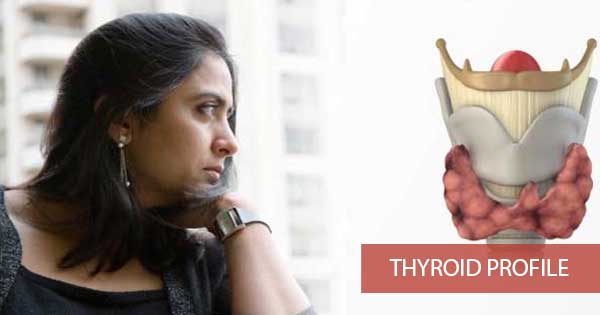
Test includes T3, T4, TSH

What is thyroid?
Thyroid is an endocrine gland which is in the shape of a butterfly and is located in the front of the lower neck. Thyroid gland has many functions, but the most important function is to produce thyroid hormones. The essential thyroid hormones are:
Apart from these there is also another hormone called thyroid stimulating and produced by the pituitary gland which stimulates the thyroid gland to produce thyroxine. These are the hormones which are being produced by the thyroid gland and with blood these hormones are carried forward to every tissue in the body.
These thyroid hormones help in regulating your metabolism, body temperature, energy, weight and mood.
What is the Thyroid profile test?
The Thyroid profile test in Panchkula is a combination of thyroid test in Panchkula which aids to determine how appropriately your thyroid gland is working, by evaluating the levels of the thyroid hormones in your blood.
Your thyroid gland may not operate properly as it should, if you have certain disorders related to your thyroid gland. A thyroid function test in Panchkula is designed to diagnose disorders related to the thyroid gland. The diseases are:
What is hypothyroidism?
Hypothyroidism or underactive thyroid is a situation where your thyroid gland is not able to produce or produce too few of the thyroid hormones. The very common cause of developing hypothyroidism is Hashimoto's disease.
What is hyperthyroidism?
Hyperthyroidism is a condition where your thyroid gland becomes overactive for which your thyroid gland produces too much of thyroid hormones than your body’s requirements. Graves’ disease can cause an overactive thyroid gland.
When should you go for the thyroid function test?
Your doctor may ask to go for this test if they suspect that you may have thyroid disorder, or you should go for this test if you are having symptoms of hypothyroidism and hyperthyroidism.
Hypothyroidism symptoms are:
Hyperthyroidism symptoms, includes:
What will be measured in the test?
This test will help to measure:
What samples will be required?
A simple blood sample will be required for the testing. A phlebo will collect a small amount of blood through a vein in your hand. After collecting the blood sample, it will be stored in the container and later it will be sent to the laboratory for the examination. Thyroid test price in Panchkula is very reasonable and you can also find a thyroid test at home in Panchkula to find out which labs are offering sample collection from home services.
What test preparations do you need?
This function test does not have the requirement of fasting. However, if your doctor has also ordered other tests with it then you may need to fast for a certain time period. Aside from that, no specific test preparations are needed.
What will be the result interpretation?
Every laboratory provides their reference ranges within the test result, but the reference ranges varys from lab to lab. However, the typical result interpretation would be:
The interpretation is a typical interpretation, but you should consult with your doctor about what the test result specifically indicates for you. If you have an abnormal test result, they will prescribe you additional tests to confirm a diagnosis.